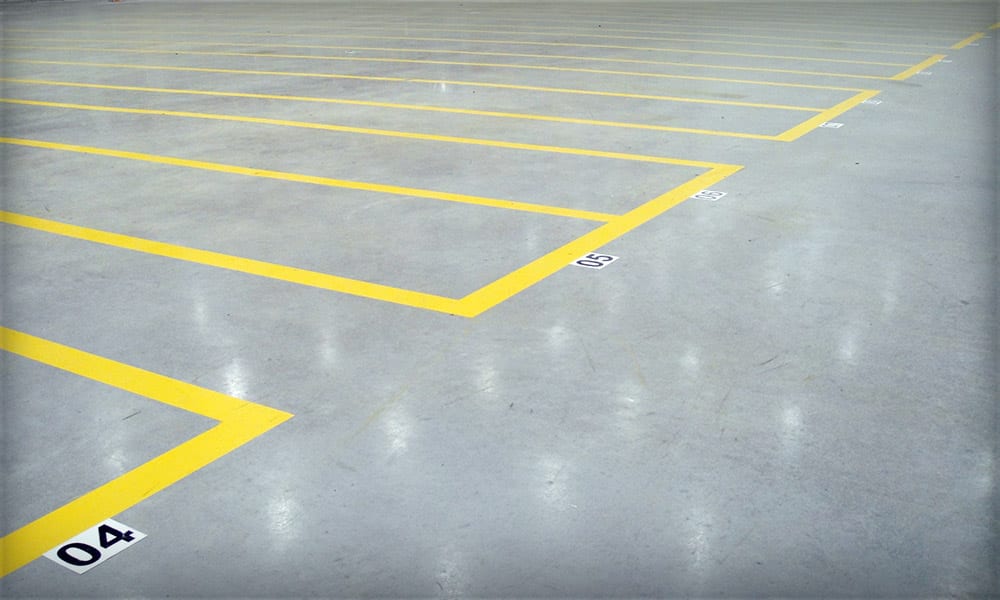Floor labels are a common sight in most commercial facilities due to their convenience in conveying important information directly on the floor surface. These labels are especially helpful in high traffic staging areas and storage locations where many different items are located and moved frequently. Vinyl and polyester are two common materials for floor labels. An added benefit of these substrates is that they not only provide excellent durability but are also waterproof and protect against additional contaminants.
Waterproof labels are an excellent choice not only for outdoor environments but also inside a facility. These durable labels are known for their ability to withstand exposure to extreme weather conditions such as rain, snow, and ice. But many of the same qualities that allow these labels to survive outdoors can also add significant protection to the floor labeling in your factory, warehouse, or office. Here are four important reasons why you should consider waterproof warehouse floor labels.

1. Water Resistance4 Reasons Your Floor Labels Should be Waterproof
When most people think of waterproof labels, they think about potential exposure to water or other liquids. On the typical factory or warehouse floor, there are many opportunities for water to be present. Routine cleaning activities, foot traffic, and forklift operation could all bring water or moisture onto the facility floor. Some items in the building can be protected by raising them off the floor or providing cover. Floor labels are attached directly to the floor surface in high traffic areas and therefore should be resistant to water.
Potential conditions for a wet floor surface are even more noticeable in tropical or extremely cold climates with significant precipitation in the form of rain or snow. The materials used to fabricate waterproof floor labels can withstand exposure to water for extended periods of time without significant degradation of the graphics or damage to the surface. By using a label made of vinyl or polyester you can ensure that your floor labels will remain readable for many years.
2. Stain Resistance
Floor labels have many important uses, and it is vital that they remain both legible and visible, which is one of the main reasons that they are placed in high traffic areas. A few of the most common uses for waterproof floor labels are:
- Safety communication
- Setting direction and orientations
- Identifying product and storage areas
- Communicating proper instructions
- Directing equipment and foot traffic
One frequent source of label damage is exposure to a chemical or substance that is not compatible with the label material. Damage could cause staining or a breakdown of the label surface.
Floors need to be cleaned, and waterproof labels can make the process easier by offering resistance to common solvents or cleaners that may be used. In the case of a chemical spill or other issues within a factory, durable floor labels also show resistance to many caustic and acidic materials. Waterproof floor labels are easy to clean, so you can have confidence that they can stand up to many common contaminants that would otherwise cause stains or damage, meaning you won’t be faced with costly floor label replacements because your labels suffered damage from routine cleaning tasks or accidents.
3. UV Resistance

In some situations, facility management may overlook the potential effects that large windows or open doors could have on signs and labels. Over time, prolonged exposure to sunlight can cause printed and colored surfaces to fade. This degradation can sometimes have a dramatic impact on the legibility of labels and the ability to scan any barcodes that may be printed on them.
To best protect against these types of potential damage, it is best to choose a label that has an appropriate level of resistance to UV rays. Most waterproof labels are also UV resistant by nature, so it is possible to protect against different conditions with a single material. Choosing a waterproof floor label gives you the flexibility to use them for indoor or outdoor applications and cover areas such as loading docks and walking paths.
4. Temperature Resistance4 Reasons Your Floor Labels Should be Waterproof

Placing floor labels in certain areas, such as a walk-in freezer, can be challenging due to the extremely cold temperatures in the area. Some label materials could become warped or damaged due to these conditions. In addition, adhesives that may be used with common labels could detach from the floor surface.
Using waterproof floor labels in your facility can add significant durability and protection against potential contaminants and sources of damage. Most warehouses, offices, and factories are busy areas, and it can be difficult to anticipate all possible hazards. Choosing floor labels that are also waterproof can help you ensure the integrity and readability of your labels in both known and unknown conditions.
Source: https://www.camcode.com/asset-tags/4-reasons-your-floor-labels-should-be-waterproof/


